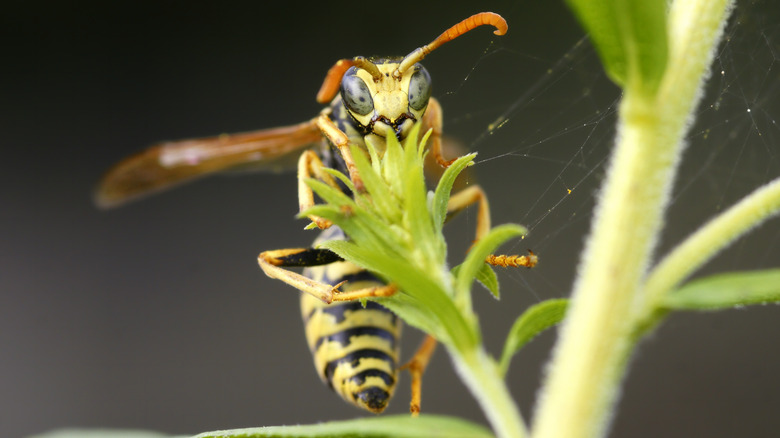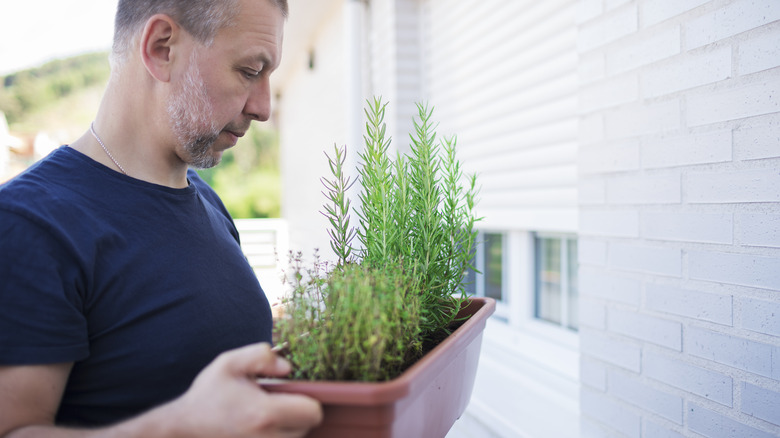The Fragrant Herb You'll Want To Add To Your Garden To Deter Wasps
Paper wasps and yellowjackets are known for being aggressive backyard bugs. Sometimes it can feel like they attack for no reason or purposely chase their victims across the yard, but these insects don't necessarily "have it out" to get humans; they're just naturally territorial and very protective of their nests. Wasps can become especially irritable and active during fall, when available insect prey, fruit, and flower nectar begins to disappear. Around this time, their nests are typically at their largest too, meaning that they have lots of hungry mouths to feed. Therefore, it makes sense that already territorial wasp parents could be feeling extra hangry! Still, you might not want them in your outdoor space, and luckily, there are ways to repel them.
Wasps are no fun to deal with around your garden or patio, but they play an important role in the ecosystem as predators for other bugs, so it's best to try non-lethal ways to get rid of wasps first. Fortunately, there's one easy-going herb you can grow to tell wasps to buzz off without killing them or putting yourself at risk: rosemary. This plant is one of the most popular herbs, beloved for its fresh, camphorous aroma, culinary uses, and medicinal benefits. The hardy shrub can do more than just beautify your garden and flavor your meals; it's also an effective protector against wasps. Here's why wasps run away from rosemary and the best ways to use it in your garden for maximum protection.
Rosemary is an anti-wasp herb
Rosemary has a strong, minty scent that many humans adore, but it's this same aromatic quality that sends wasps running away from the stench. Wasps have a bloodhound-like sense of smell, which they use to locate other bugs to feed to their young or to lay parasitic eggs. This sense of smell is so delicate that military scientists have even trained wasps to detect explosives, illegal substances, buried people, and more. When they catch a whiff of pungent rosemary, wasps, yellowjackets, and other vespids will usually flee the area.
A 2013 study published by Pest Management Science tested 21 essential oils for their ability to repel yellowjackets and found rosemary to be one of the most effective essential oils of all. Rosemary mixed with geranium, clove, and lemongrass essential oils was even strong enough to keep all of the yellowjackets in the study from approaching the yellowjacket bait. Besides being able to effectively repel wasps, rosemary oil is even an active ingredient in some wasp and hornet killer sprays. Even though paper wasps and yellowjackets avoid this fragrant herb, it's still very attractive to bees and butterflies who will love to visit the shrub while it's in bloom with small flowers.
Using rosemary as natural wasp protection
Out of all the common herbs, rosemary is arguably one of the easiest to grow. To care for your rosemary herb plant, provide it with neutral, well-draining soil, warm temperatures, and full sunlight. Rosemary also grows rather happily in containers, provided it has good drainage and room for the roots to spread. By growing rosemary in containers, you can place them near outdoor seating areas or directly under porches and awnings where wasps tend to build their nests.
Of course, growing live rosemary isn't a totally foolproof method for repelling wasps, and wasps that are desperate enough will likely still take up residence around your home and garden. In that case, for even more effective power, you can pluck a few rosemary leaves and burn them or grind them to release their repelling compounds when you need them most, like while you're relaxing on the back porch. Applying the herb to your skin can also transform fresh rosemary into a mosquito repellent, which may also be effective for keeping wasps at bay. If you aren't able to grow rosemary near your porch or balcony, you can also mix up a spray with rosemary essential oil and apply it around the porch, shed, and other areas where wasps tend to land and nest. However, while rosemary essential oil is an ingredient in some wasp sprays, we wouldn't recommend spraying it directly on the insects or their nest, as this could spark an attack.


